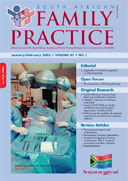CPD: Oral Contraception: Five important issues.
Abstract
The dosage of the hormones used in the combined oral contraceptive pill have, over the past 40 years, continually decreased in order to provide formulations with minimum side effects while still retaining efficacy.1-4 Women are concerned that long-term use of combined oral contraceptives (COCs) increases health risks (including an increased risk of cancer or cardiovascular disease). In this article we would like to highlight some of the above issues and some of the commonly asked questions. This would enable us to provide the necessary advice and guidance to our patients. Oral contraception is an area in the health sector where new products are constantly developed and this means that, to give patients the best available advice, general practitioners, pharmacists and gynaecologists need to stay abreast with the latest literature and developments. (SA Fam Pract 2005;47(1): 22-24)
Published
2005-02-01
Section
Review Articles
By submitting manuscripts to SAFP, authors of original articles are assigning copyright to the South African Academy of Family Physicians. Copyright of review articles are assigned to the Publisher, Medpharm Publications (Pty) Ltd, unless otherwise specified. Authors may use their own work after publication without written permission, provided they acknowledge the original source. Individuals and academic institutions may freely copy and distribute articles published in SAFP for educational and research purposes without obtaining permission.

